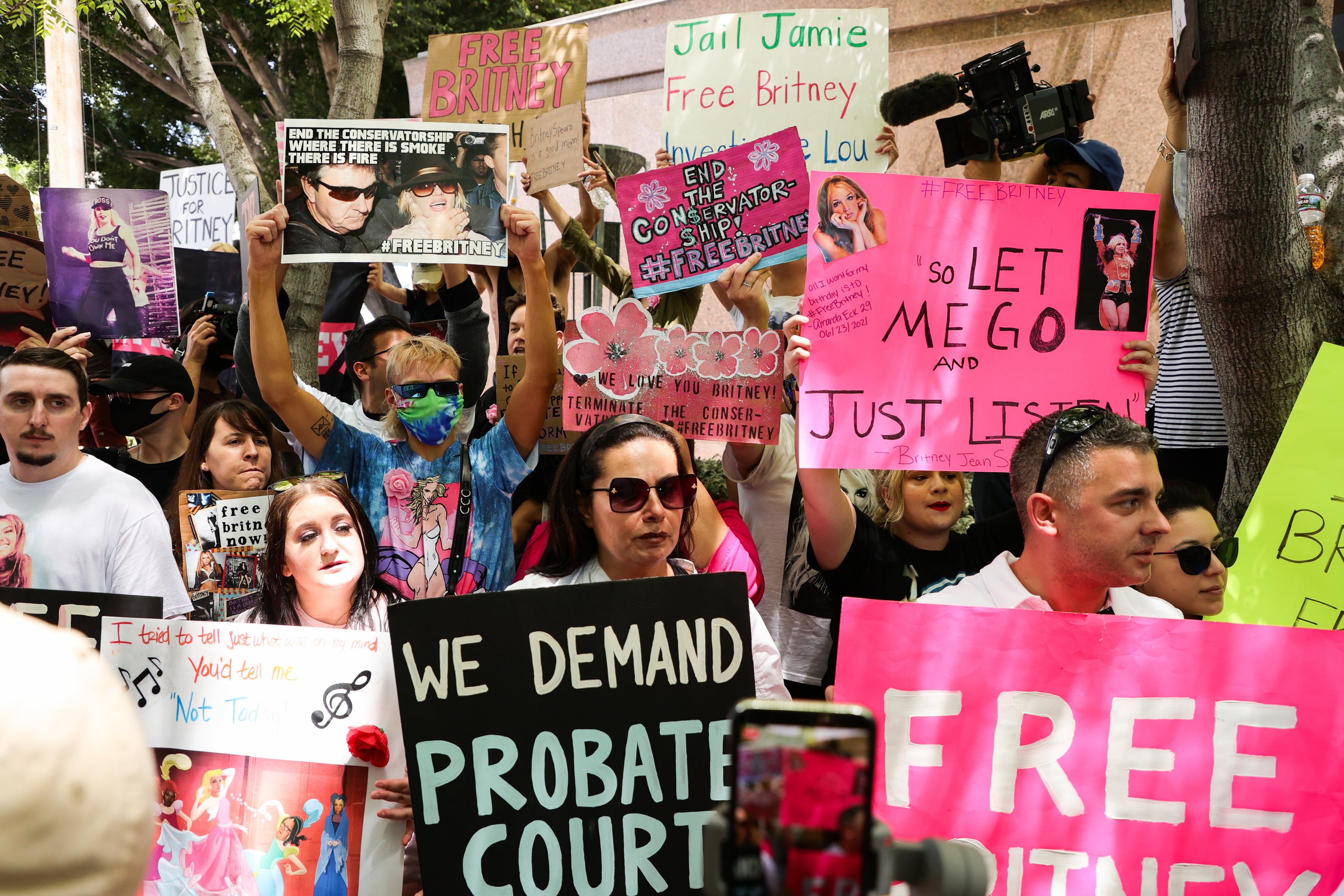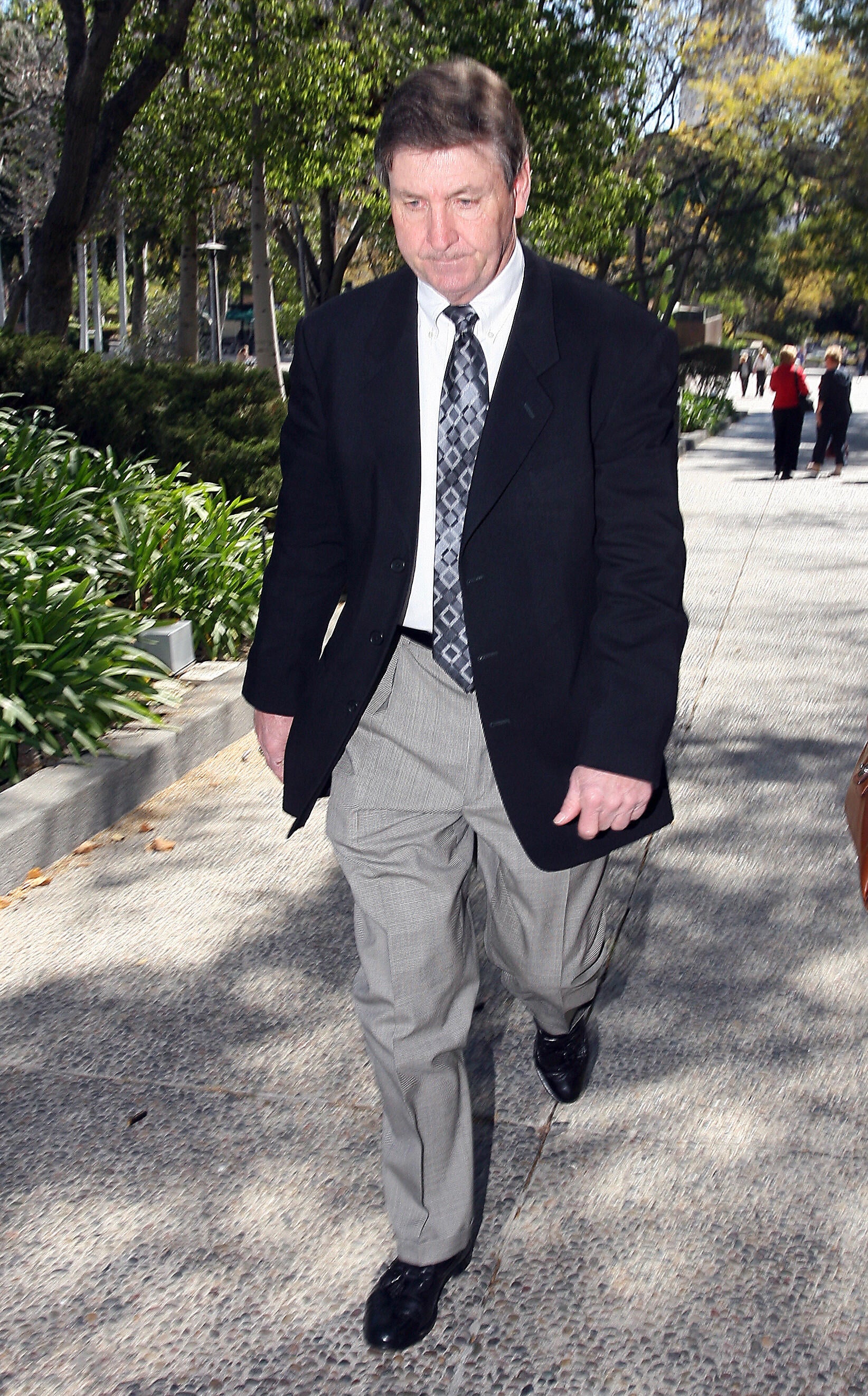What will it take to finally #FreeBritney?
This week, at long last, Britney Spears took the opportunity to make her own voice heard, and the world won’t soon forget it. Rachel Brodsky takes a look back at the recent, tumultuous years of the singer’s remarkable career and considers whether she may finally be able to take back control of her life

Earlier this week, pop music icon Britney Spears shared a video of her holiday in Maui on her Instagram. On the surface, the footage contains all the hallmarks of a pop star on holiday: the camera pans across a stunning view from a penthouse suite; the singer relaxes by the pool with boyfriend, Sam Asghari; Harry Nilsson’s “Coconut” soundtracks a mellow car ride through tropical paradise; Spears is handed a fruity drink. Later, she rides Asghari piggyback through crystal-clear water, excitedly yelling, “I’m a minnow, baby, I’m a minnow!” As the clip wraps up, though, Spears is doing something else: there are no bodies of water or sunshine-dappled trees. She’s dancing, twirling and flipping her long, blonde hair in what appears to be a windowless studio.
Before 23 June, this might have seemed like a totally normal thing for Spears to do. Most of her Instagram videos are of her dancing with abandon to classic pop songs by Prince or Aerosmith. (Dancing is one of the many reasons Spears is still so famous decades after her career first took off in the late Nineties, with legions of pop performers echoing her finely tuned moves in their own visual setups.) Now, however, this brief moment of Spears undulating her arms and torso in front of an iPhone – while on vacation, no less – echoes the horrifying testimony she gave to Judge Brenda Penny during a special open hearing addressing the singer’s long-standing legal conservatorship. Despite taking a holiday, despite ending her popular Las Vegas residency in 2019, despite not recording new music since her last album in 2016, Spears is never not working.
“I worked seven days a week, no days off, which in California, the only similar thing to this is called sex trafficking,” Spears said in a bombshell 23-minute speech, her first public statement regarding the conservatorship, where she also claimed how she had been punished for refusing to work, having her “credit card, cash, phone, passport” taken away, put on lithium (a powerful anti-psychotic) and placed in a mental health facility against her will.
“It’s not OK to force me to do anything I don’t want to do,” Spears said, anger in her voice, adding that “I should be able to sue [handlers] for threatening me” and saying if she doesn’t do as she’s told, then “we can’t let you have your money and go to Maui on your vacations”.

Based on this new information from Spears herself, it’s now impossible not to view the dance portion of the singer’s vacation video as looking coerced. As she said herself in her testimony, she’s been working since she was 17 years old, producing hit after hit and then, in her thirties, performing night after night either on tour or at her Vegas residency. Now, all she wants is a break, and the freedom to do what most people take for granted: get married, have children, decide how we spend our money. These are all things Britney’s conservatorship prevents her from doing.
Conservatorships are generally designed to protect people who cannot take care of themselves. They are almost exclusively reserved for the elderly and people with severe learning difficulties. Spears’s conservatorship began in 2008 after a series of public breakdowns, and it has been largely overseen by her father, James “Jamie” Spears.
So, how did Britney, who in the Nineties and early 2000s practically defined the Y2K pop music takeover, with groundbreaking hits like “...Baby One More Time”, “Toxic”, and “Womanizer”, wind up in this place? Why is she, one of the most famous people on the planet, fighting for basic liberties, such as the right to choose her own attorney and take a much-earned break from being her family’s cash cow?
If I wasn’t under the restraints I’m under right now, with all the lawyers and doctors and people analysing me every day – if that wasn’t there, I’d feel so liberated
The story traces back to 2007; Britney, then just 27, had filed for divorce from her husband Kevin Federline, with whom she shared two sons. Dealing with a whirlwind of custody issues and paparazzi hounding her every move, as neatly outlined in The New York Times’s bombshell Framing Britney Spears documentary, the pop singer suffered a series of highly public meltdowns, at some points escalating into physical altercations with the very camera people chasing her. One of the images audiences most closely associate with this time is Britney walking into a salon and shaving her head. It was also around this time that Britney developed an ominous relationship with Sam Lutfi, a manager-type figure whom Britney’s mother, Lynne Spears, later claimed had crushed pills into her daughter’s food and kept her drugged, which he has denied.
In early 2008, Britney was involuntarily committed to a psychiatric hospital for a second time. Her father Jamie and attorney Andrew Wallet were granted temporary conservatorship the following month. Later that year, her conservatorship was extended indefinitely, with a judge citing the complexity of her financial situation and stating that she is “susceptible to undue influence”.
After that, one might have expected Britney to leave the spotlight, perhaps to spend time with loved ones and focus on her health, away from flashbulbs and prying eyes. But precisely the opposite happened; in November 2008, MTV released a documentary called Britney: For the Record, which, until recently, was the only evidence fans had to go on about how the singer felt about her conservatorship.
“I think [the conservatorship is] too in control,” she said at the time. “If I wasn’t under the restraints I’m under right now, with all the lawyers and doctors and people analysing me every day – if that wasn’t there, I’d feel so liberated. When I tell them the way I feel, it’s like they hear but they’re really not listening … It’s like, it’s bad. But I’m sad.”
For many years after the conservatorship set in, Britney’s career appeared to flourish. She released three albums – Femme Fatale (2011), Britney Jean (2013), and Glory (2016) – and kicked off a successful residency, Piece of Me, in Las Vegas. But in January 2019, she abruptly cancelled its follow-up, Domination, citing her father’s health after he “almost died”.
“It’s important to always put your family first… and that’s the decision I had to make,” she wrote on her social media at the time. “I had to make the difficult decision to put my full focus and energy on my family at this time. I hope you all can understand.”
Though Britney never publicly said anything about the state of her conservatorship, a fan-driven movement to #FreeBritney was reaching a boiling point around the internet. For months, fans had been pointing out alleged oddities in Britney’s Instagram account, claiming the singer was trying to send coded messages begging for help through aspects as minor as the colour of her clothes and even her choice of emojis. Then, in spring 2019, the podcast Britney’s Gram seemingly confirmed fans’ suspicions. A former paralegal claiming to have worked under Britney’s conservatorship left an explosive voicemail, claiming the pop star had been held at a mental health facility against her will since mid-January after she reportedly stopped taking her medication.

“...I used to be a paralegal for an attorney that worked with Britney’s conservatorship and what is happening is... disturbing to say the least,” the man said (the podcast hosts confirmed his identity as being legitimate). “Basically, Britney was in rehearsals for Domination. It came to Jamie’s attention that Britney was not taking her medication as prescribed. She was missing a lot of doses and full-on not taking them.
“She did not want to go... I, of course am just a paralegal I never spoke with her, but from what I understood, this was not a decision she made at all,” he added.
In May 2019, a moment Britney referred to in her latest testimony where she didn’t feel heard, the singer appeared in probate court to ask the judge to ease restrictions imposed by the conservatorship and give her more freedom. That summer, Britney’s now-teenage sons were granted a restraining order against Jamie after he was allegedly involved in a “physical altercation” with one of them.
Later that year, Jamie was replaced as his daughter’s conservator by professional conservator Jodi Montgomery, while citing health reasons for his temporary removal from managing her personal life, though he continued to oversee her finances in conjunction with the financial firm the Bessemer Trust.
Since then, in the past 24 months, a string of hearings have taken place, with Britney’s court-appointed lawyer, Samuel Ingham, formally filing to remove Jamie as the conservatorship’s overseer, saying that his client “strongly opposed” to him returning to control of her personal affairs.

By this time, the #FreeBritney movement gained new momentum thanks in part to the explosive Framing Britney Spears documentary, sparking public conversation about the treatment of Spears and other celebrities by the tabloids in the 2000s. Intensifying the situation, Britney’s boyfriend Asghari wrote on Instagram that Jamie is a “total d***” who tried to control their relationship.
Needless to say, by the time Spears gave her charged public testimony on 23 June, she was not only speaking her truth, but she was validating years of suspicion. The #FreeBritney movement was not, as many believed at the beginning, simply a group of overworked fans creating a “conspiracy theory”, as Jamie alleged in August 2020. It turns out that Britney fans were on to something.
All of this begs the question: what will it take to actually #FreeBritney? According to her testimony, she had not been aware that she could simply ask her lawyer to file to dissolve the conservatorship. As The New York Times followed up, this calls into question what exactly Ingham has been telling his client up until this point, and what his motives have been in all of this. (As she pointed out numerous times in her testimony, Britney pays everyone involved in her conservatorship, including her and her father’s counsel).
“I didn’t know I could petition the conservatorship to be ended,” Britney told the judge during a live feed of the hearing. “I’m sorry for my ignorance, but I honestly didn’t know that ... My attorney says I can’t – it’s not good, I can’t let the public know anything they did to me.”
“He told me I should keep it to myself, really,” the singer added.
While the next steps remain unclear, the logical move would be for Ingham to file a petition to formally end Britney’s conservatorship. Either way, the world has heard Britney, and they won’t soon forget it.
Join our commenting forum
Join thought-provoking conversations, follow other Independent readers and see their replies
Comments


Bookmark popover
Removed from bookmarks